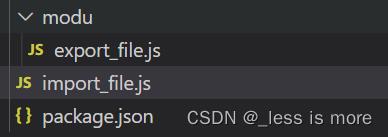nodejsimportexportexportsmodule.exports
Posted _less is more
tags:
篇首语:本文由小常识网(cha138.com)小编为大家整理,主要介绍了nodejsimportexportexportsmodule.exports相关的知识,希望对你有一定的参考价值。
1、import 和 export(ES6特性)
目录结构

export_file.js
export const myNumbers = [1, 2, 3, 4];
const animals = ['Panda', 'Bear', 'Eagle']; // Not available directly outside the module
export function myLogger()
console.log(myNumbers, animals);
export class Alligator
constructor()
// ...
let anotherNum = [3, 2, 1];
export anotherNum, myLogger as Logger
import_file.js
import * as Utils from './export_file.js';
console.log(Utils)
console.log(Utils.Logger())
console.log(Utils.myLogger())
package.json:这个文件很关键,表示import的是一个module,不然会报错
"type": "module"
运行结果

也可以把import的方式换成
import myLogger, Logger, myNumbers as num from './export_file.js';
console.log(num)
console.log(Logger())
console.log(myLogger())
输出如下

如果把目录结构改成:export单独放,package.json和import文件一起

一样可以正常运行
如果把import单独放

则不能正常运行,会报错MODULE_NOT_FOUND

因此package.json是为了把import_file.js变成一个module,才能使用import
2、exports和require
用require导入一个module,不需要import_file.js自己是一个module,而exports本身将export_file.js以module的形式导出
目录结构

export_file.js
const getName = () =>
return 'Jim';
;
const getLocation = () =>
return 'Munich';
;
const dateOfBirth = '12.01.1982';
exports.getName = getName;
exports.getLocation = getLocation;
exports.dob = dateOfBirth;
import_file.js
const user = require('./export_file');
console.log(user.getName())
console.log(user.getLocation())
console.log(user.dateOfBirth)
console.log(user.dob)
console.log(
`$user.getName() lives in $user.getLocation() and was born on $user.dob.`
);
输出

exports的方式改成如下也可以
exports.getName = () =>
return 'Jim';
;
exports.getLocation = () =>
return 'Munich';
;
exports.dob = '12.01.1982';
import中也可以指定导入哪些
const getName, getLocation, dob = require('./export_file');
console.log(getName())
console.log(getLocation())
console.log(dob)
console.log(
`$getName() lives in $getLocation() and was born on $dob.`
);
3、module.exports和require
module.exports用于只导出一个,比如一个class
目录结构不变
export_file.js
class User
constructor(name='Jim', age='Munich', dob='12.01.1982')
this.name = name;
this.age = age;
this.dob = dob;
getUserStats()
return `
Name: $this.name
Age: $this.age
DateOfBirth: $this.dob
`;
module.exports = User;
import_file.js,将export_file作为整体导入,即得到导出的class
const User = require('./export_file');
let myUser = new User();
console.log(
myUser.getUserStats()
);
运行

也可以用的跟之前exports一样,导出一个dict,里面包含多项内容
module.exports =
getName: () =>
return 'Jim';
,
getLocation: () =>
return 'Munich';
,
dob: '12.01.1982',
;
import 仍然是
const getName, getLocation, dob = require('./export_file');
console.log(
`$getName() lives in $getLocation() and was born on $dob.`
);
可以看到跟之前的结果是一样的

exports 和 module.exports 本质上是指向一个地方
比如下面三句是等价的
module.exports =
dob: '12.01.1982',
;
exports.dob = '12.01.1982';
module.exports.dob = '12.01.1982';
如果输出module来看
最终都会将dob加入到module的exports里面

但需要注意,在我们使用module.exports = dob: '12.01.1982';,是直接将一个object赋值给exports,这将会覆盖exports里的其他内容
以上是关于nodejsimportexportexportsmodule.exports的主要内容,如果未能解决你的问题,请参考以下文章